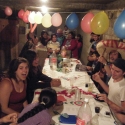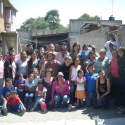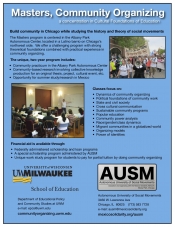About Master's in Community Organizing
The Autonomous University of Social Movements is a unique organizing/education project dedicated to the theory, practice and context of community organizing. Grounded in a commitment to developing effective strategies for profound social change, the AUSM (pronounced “awesome”) Master’s Program in Community Organizing is a joint project with the University of Wisconsin-Milwaukee and is based in a vibrant community center in Albany Park, Chicago. Student praxis involves development of strong critical theoretical foundations tested against and refined during daily participation in social movements. This includes:
-Political/cultural analysis
-Popular education practice and theory
-Cross-cultural, cross-class communication
-Leadership skills
-Urban dynamics, including urban theory, public education, labor and employment, policing, health care, and local politics
-Issues in community organizing, including race/class/gender dynamics, identity, leadership roles, and specific challenges facing Latino communities
-Organizing methods based on Zapatista, Alinsky-style, labor, NGO, student, and faith-based models
-Community organizing tactics, including cooperatives, economic alternatives, health care, housing, popular education, ad political initiatives
-Participatory action research methodology
-Spanish/English fluency
Why study community organizing?
Latino immigrant communities are expanding rapidly in the US, with increased growth expected in the coming decades. Latino immigrants face a series of challenges that are poorly understood - or not even considered - by the larger established population, including language challenges, racism, family disintegration, lack of work and educational opportunities, cultural adjustments, lack of familiarity with social and political resources, etc. Especially in the context of shrinking governments in the neoliberal era, Latino immigrants are largely left to fend for themselves in an often hostile and foreign culture. In this context, (re)construction of community is key to building better lives and fomenting significant social change.
While hundreds of community organizations exist in Latino communities, there are only a handful of academic programs (limited to individual courses at the undergrad level) offered in the US specifically around community organizing or popular education, and there are currently no master’s programs.
This serious lack results in community organizers who are forced to learn haphazardly “on the job.” There is often little time for theoretical reflection or systematic development of organizing or education skills. The master’s program in Community Organizing offers a space for development of effective and theoretically grounded social actors prepared to confront the challenges of organizing in Latino communities in the 21st century.
The Albany Park Autonomous Center
The program is centered in the Albany Park Autonomous Center, a largely Latino community center in an immigrant neighborhood on Chicago’s northwest side. The Centro Autónomo is a community center in every sense of the word. In this time of free trade regimes that demolish economies and extreme anti-immigrant sentiment, this space serves as a place to reconstruct the collectivity that the current economic system is very efficient at destroying. The foundation of this practice of community-building is rooted in monthly asambleas and weekly meetings with different committees established by community members. Students combine theory with hands-on practice in various community center projects, including:
-An adult bilingual high school founded on popular education practices
-ESL and computer classes
-A health program that provides free alternative community medicine (herbal therapies, acupuncture, massage therapies, etc)
-A cleaning cooperative organized by immigrant women
-Community initiatives, including anti-eviction, day labor, and youth organizing
-A bi-national solidarity center that works with Mexican social movements, including indigenous movements in Chiapas, housing movements in Mexico City, campesino and ex-bracero movements in Tlaxcala, and anti-femicide and working class movements in Ciudad Juarez
Course structure
The two-year, thirty-credit master’s program includes four main components: community organizing courses, cultural foundations of education courses, a community practicum, and an optional summer program.
Community organizing courses taught at the Albany Park Autonomous Center by AUSM:
-Ed Pol 711: Community Organizing—Collective Action for Social Change (3 credits)
-Ed Pol 712: Community Participation and Power (3 credits)
-Ed Pol 713: Structural/Political Analysis in Community Organizing and Popular Education (3 credits)
-Ed Pol 715: Popular Education Theory and Practice (3 credits)
-Ed Pol 999: Thesis Seminar (2 credits)
Cultural foundations of education courses taught online by University of Wisconsin-Milwaukee faculty:
-Ed Pol 705: Sociology of Education and Community Engagement (3 credits)
-Ed Pol 710: Research Methods for Education and Community Engagement (3 credits)
-Ed Pol 740: Modern Philosophies of Education and Community (3 credits)
-Ed Pol 750: History of Education in American Communities (3 credits)
The Community Practicum is 1 credit per semester. Students participate as organizers in an area of the Albany Park Autonomous Center’s work, allowing them to pair theoretical study with practical experience. Students generally continue with the same practicum project over four semesters and receive support from AUSM staff. Often research done during the practicum becomes the foundation of the master’s thesis, presented during the fourth semester of the program.
The optional Summer Program is comprised of four to eight weeks spent in Mexico studying the context, theory, and practice of Mexico’s most dynamic social movements, including indigenous movements in Chiapas, campesino movements in Tlaxcala, and housing movements in Mexico City.
AUSM staff
Dr. Thomas Hansen – holds a doctorate in Rural Development with a specialty in social movements from the Universidad Autónoma Metropolitana-Xochimilco in Mexico City. Dr. Hansen has 28 years of experience in community organizing and is a co-founder of the Albany Park Autonomous Center, the Autonomous University of Social Movements and the Mexico Solidarity Network.
Dr. Maria Gloria Benavides Guevara – holds a doctorate in Anthropology from the Centro de Investigaciones y Estudio Superiores en Antropología Social (CIESAS) in Mexico City. Dra. Benavides has 30 years of experience in community organizing as a direct participant/leader in Mexican social movements.
Prof. Carlos Euceda – is a recognized expert in popular education. He received training from the Consejo Latinoamericano de Ciencias Sociales based in Argentina, with coursework completed in Honduras. Prof. Euceda worked with the International Labor Organization leading popular education courses in indigenous communities in Honduras for two years. He has 12 years of experience working with community organizations in Honduras and two years in Chicago.
Prof. Stuart Schussler holds a master’s degree in International Relations from the Facultad Latinoamericana de Ciencias Sociales- Ecuador. His previous work includes human rights observation at a mining conflict in Intag, Ecuador and work with Colombian refugees in Quito.
Prof. Tony Nelson holds a master’s degree in communication theory from Syracuse University. He has worked as a community organizer, teacher, and human rights activist around the issues of immigration, education, prison reform, anti-neoliberalism, and US-sponsored torture.
Financial aid is available through federal scholarship/loan programs administered by the University of Wisconsin-Milwaukee. The Autonomous University of Social Movements also offers scholarship and work-study options, with preference given to first or second-generation immigrants with financial needs.
Admissions are only open in September. The application deadline for the program is June 30th. The program is limited to seven students per year, on a first-come basis.
Apply today! Students must apply and be accepted with both AUSM and the University of Wisconsin-Milwaukee. Information on the admissions process with AUSM is available here and UWM's application process is outlined here.
For more information call 773 583 7728 or email ausm [at] mexicosolidarity [dot] org




